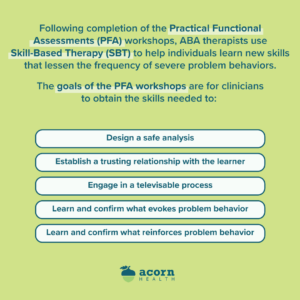Clinically reviewed by Paul Doher, BCBA, M.A., LBA, National Director of Clinical Quality

Severe problem behavior is defined as a significant emotional or behavior issue, which may include self-injury, destruction, and aggression. These types of behaviors can be challenging for families to navigate, and extremely common for individuals with autism. Because access to preferred items and activities are part of the reason why these behaviors persist, intervention can be challenging.
Rest assured, families can find the support they need to support their child at Acorn Health. Clinicians across the organization attend focused workshops specifically designed to intervene on severe problem behaviors.
PFA Workshops
During these workshops, clinicians receive training on the Practical Functional Assessment (PFA) process, which includes designing and implementing a safe analysis to confirm the reasons why problem behavior occurs. This approach, developed by Acorn Health Advisory Board Chair Dr.Greg Hanley and colleagues, measures and identifies severe problem behavior. Following completion of the PFA, ABA therapists use Skill-Based Therapy (SBT) to help individuals learn new skills that lessen the frequency of severe problem behaviors.
 When clinicians gather at Acorn Health for this training, the goals of the PFA workshops are for clinicians to obtain the skills needed to:
When clinicians gather at Acorn Health for this training, the goals of the PFA workshops are for clinicians to obtain the skills needed to:
- Design a safe analysis
- Establish a trusting relationship with the learner
- Engage in a televisable process
- Learn and confirm what evokes problem behavior
- Learn and confirm what reinforces problem behavior
Once they have completed PFA and SBT training, Acorn Health clinicians are well-positioned to move forward with teaching communication, tolerance, and cooperation during regularly scheduled ABA therapy sessions. This specialized training is exceptionally valuable for families who are continually dealing with severe problem behaviors and are seeking a specific and effective solution to support their child.
Clinicians across Acorn Health have already undergone this hands-on learning, and once the entire national rollout is completed, every BCBA and clinical director in all seven states in which Acorn Health operates will have the opportunity to participate in training.
———————————–
To help families better understand PFA and SBT processes in the treatment of severe problem behaviors of children with autism, we’ve put together this brief overview:
Question: What is the Purpose of Practical Functional Assessment (PFA)?
Answer: The PFA and SBT are tools that allow clinicians to understand why a severe problem behavior occurs and then change the way the person reacts to the conditions that evoke problem behavior. The PFA itself includes an interview and analysis, typically occurring in one or two visits. The individual performing the PFA interviews the learner and gathers information about the personally relevant outcomes when the problem behaviors happen. The results from the PFA are then used to inform a skill-based treatment (SBT).
Question: Do you work with children with severe problem behavior at every Acorn Health location?
It is possible a client will demonstrate such severe problem behavior that we refer them to a more intensive service if we cannot successfully intervene, but that would come after a comprehensive PFA and after our clinicians attempt to address the behavior first.
Question: What is Skill-Based Treatment (SBT) in ABA Therapy?
Answer: Following the PFA, skill-based treatment helps teach communication, contextually appropriate behaviors and toleration to replace severe problem behaviors. During SBT in Applied Behavior Analysis (ABA) therapy, the clinician teaches the learner to relinquish favorite items, encourage the individual to play independently, cooperate with adult-led activities, or complete self-care tasks.
By encouraging these behaviors, the goal is to decrease severe problem behavior frequency. SBT is practiced repeatedly over time, and in various schedules and environments. A key component of SBT is to establish trust between a caregiver and the child so they can tolerate various circumstances and situations.
Question: What is the difference between functional assessment and functional analysis?
Answer: A functional analysis is when the clinician carefully and systematically implements an analysis to determine what variables evoke problem behavior, and what circumstances reinforce problem behavior. A function assessment is when the clinician reviews the data they gathered from that session to make a recommendation for additional therapy, goal-setting, or next steps.
Question: What are the objectives of PFA and SBT?
Answer: The objectives of PFA and SBT are establishing trusting relationships between caregivers and a learner and understanding when and how a child reacts in ambiguous circumstances so that skills can be taught in those situations instead of the learner relying on problem behavior to communicate.
Is your child with autism currently struggling with severe problem behaviors? Call Acorn Health at 844-244-1818 or complete an online inquiry form to learn how we may help.